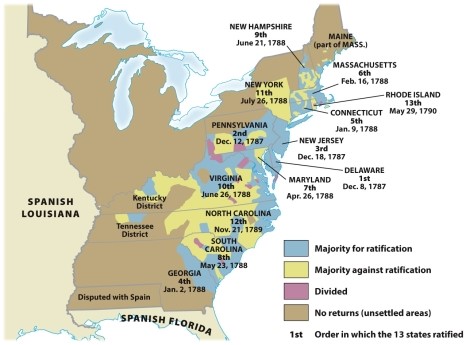Exam 8: Building a Republic
Exam 1: Ancient America Before77 Questions
Exam 2: Europeans Encounter the New World77 Questions
Exam 3: The Southern Colonies in the Seventeenth Century77 Questions
Exam 4: The Northern Colonies in the Seventeenth Century77 Questions
Exam 5: Colonial America in the Eighteenth Century77 Questions
Exam 6: The British Empire and the Colonial Crisis77 Questions
Exam 7: The War for America77 Questions
Exam 8: Building a Republic78 Questions
Exam 9: The New Nation Takes Form77 Questions
Exam 10: Republicans in Power77 Questions
Exam 11: The Expanding Republic77 Questions
Exam 12: The New West and the Free North28 Questions
Exam 13: The Slave South77 Questions
Exam 14: The House Divided77 Questions
Exam 15: The Crucible of War77 Questions
Exam 16: Reconstruction77 Questions
Exam 17: The Contested West77 Questions
Exam 18: Railroads, Business, and Politics in the Gilded Age77 Questions
Exam 19: The City and Its Workers77 Questions
Exam 20: Dissent, Depression, and War77 Questions
Exam 21: Progressivism From the Grass Roots to the White House77 Questions
Exam 22: World War I: the Progressive Crusade at Home and Abroad77 Questions
Exam 23: From New Era to Great Depression77 Questions
Exam 24: The New Deal Experiment77 Questions
Exam 25: The United States and the Second World War77 Questions
Exam 26: Cold War Politics in the Truman Years77 Questions
Exam 27: The Politics and Culture of Abundance77 Questions
Exam 28: Reform, Rebellion, and Reaction77 Questions
Exam 29: Vietnam and the End of the Cold War Consensus78 Questions
Exam 30: America Moves to the Right77 Questions
Exam 31: The Promises and Challenges of Globalization Since76 Questions
Exam 32: Citizenship, Indian Removal, Equality, Women's Rights, Native American Relations, Slavery, Religion, Labor, Westward Expansion, and North-South Differences.10 Questions
Exam 33: Historical Perspectives on American Politics and Society10 Questions
Select questions type
Two-thirds of the Constitutional Convention's delegates came from which segment of the population?
(Multiple Choice)
4.8/5  (37)
(37)
Match the term with the definition.
-A bogus coup threatened by Continental army officers and congressional leaders in 1782-83; they thought the forceful demand for military back pay and pensions would create pressure for stronger taxation powers. General Washington defused the threat.
(Multiple Choice)
4.7/5  (32)
(32)
Match the term with the definition.
-In effect from 1781 to 1788, this document defined the Union as a confederation of equal states with no executive, limited powers, and existing primarily to foster a common defense.
(Multiple Choice)
4.9/5  (43)
(43)
Match the term with the definition.
-Fearing that a powerful and distant central government would be out of touch with citizens' needs, this group opposed ratification of the Constitution, complaining that the document also failed to guarantee individual liberties in a Bill of Rights.
(Multiple Choice)
4.9/5  (40)
(40)
How did the delegates to the Constitutional Convention create a presidency out of the reach of direct democracy?
(Multiple Choice)
4.7/5  (34)
(34)
Who, along with Alexander Hamilton, was instrumental in calling for the Philadelphia meeting in May 1787 to discuss the Articles of Confederation?
(Multiple Choice)
4.8/5  (38)
(38)
Discuss the country's financial predicament following the American Revolution and how these problems led to the Newburgh Conspiracy.
(Essay)
4.9/5  (43)
(43)
According to Map 8.3: Ratification of the Constitution, 1788-1790, Antifederalist strength was generally concentrated in 
(Multiple Choice)
4.8/5  (37)
(37)
Ratification of the Constitution was not an easy thing to accomplish. Discuss the positions of the various states and their reasons for or against ratification.
(Essay)
4.8/5  (40)
(40)
Why were some states reluctant to include "equality language" in their bills of rights and constitutions?
(Multiple Choice)
4.7/5  (27)
(27)
What did the congressional land ordinances of 1784 and 1785 accomplish?
(Multiple Choice)
4.7/5  (37)
(37)
What led to the largest emancipation of blacks in the deep South immediately after the Revolution?
(Multiple Choice)
4.9/5  (36)
(36)
The Continental Congress gave the job of organizing the Northwest Territory to Thomas Jefferson. Discuss the terms of the three bills that subsequently evolved and passed Congress.
(Essay)
4.9/5  (30)
(30)
What financial problem did the confederation government face after the war?
(Multiple Choice)
4.9/5  (36)
(36)
As a part of the Great Compromise, delegates at the Philadelphia convention agreed
(Multiple Choice)
4.7/5  (38)
(38)
What did the national government lack under the Articles of Confederation?
(Multiple Choice)
4.9/5  (32)
(32)
Showing 21 - 40 of 78
Filters
- Essay(0)
- Multiple Choice(0)
- Short Answer(0)
- True False(0)
- Matching(0)